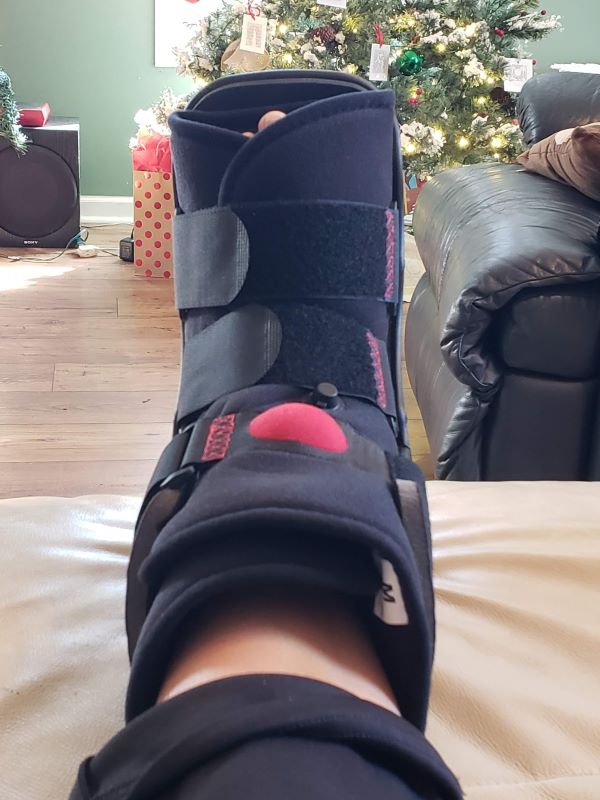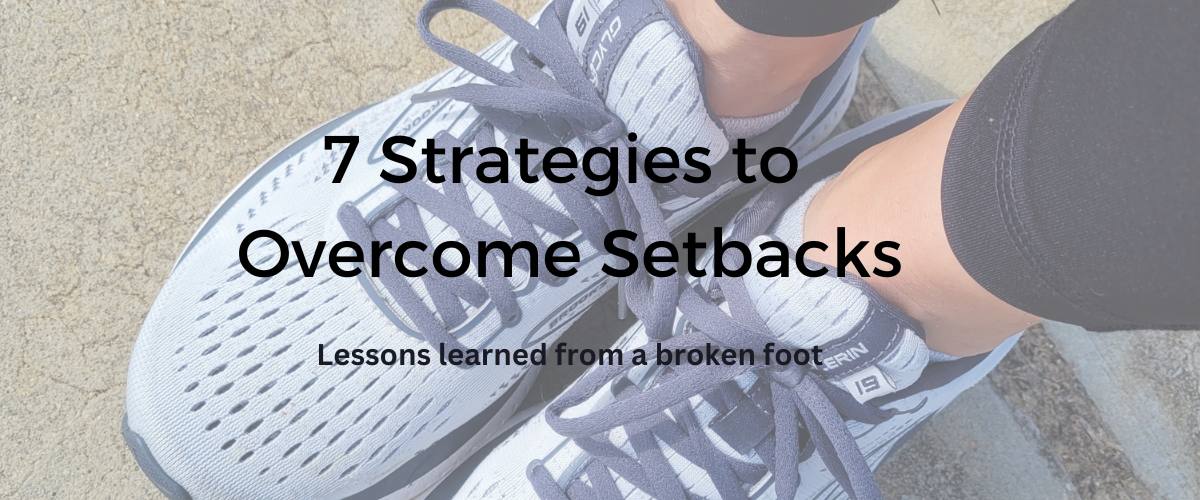Setbacks in life are inevitable. The definition of setback is “a check to progress; a reverse or defeat.” We move forward and BAM, that progression forward hits a wall. Progress is stopped in its tracks. It may even be bounced backwards. Setbacks can come in any form. Sometimes setbacks are faced at work or in school. Other times there are physical setbacks with illnesses and injuries. Then there are setbacks that affect relationships, mindset, and personal growth. One year ago today, I experienced a physical setback that proved to be a huge learning experience for me.

Setback
I have mentioned that I started karate the summer before I turned 40. Some kicks and combinations have proven to be challenging for a 40-year-old body that is not very flexible. I was making progress though. Last year I had already had to overcome some things but was feeling pretty good about the progress I was making. Then a poor choice in my training at home stopped that progress in its tracks. I landed wrong on my foot while doing drills and sank to the ground in pain. I tried to assure myself and my kids that I was fine. The reality was within minutes my foot was swelling and getting numb. My daughter became the mature one in the moment. She got me in the car and drove me to get x-rays. They, of course, revealed a broken foot. My physical progress at that point was halted, and I was extremely disappointed. Later I realized that the situation opened up ways for me to make progress in overcoming.
Acknowledge
One of the first things that must been done when faced with a setback is acknowledge it. We have to be honest with ourselves and call it what it is. Allowing a moment of sadness and grief over the setback is needed. By acknowledging and grieving over the setback, we allow ourselves to move through the proper steps in order to be able to overcome it. Trying to brush it off can hinder the strength that we can gain from working through things with honesty. Again, staying in a state of grief over the setback complicates the matter, but allowing yourself a moment of time to grieve will set you up to overcome.
Make a Plan
The next strategy to overcoming setbacks is to make a plan. Moving forward requires that we strive to avoid discouragement. Any setback has a tendency to make us discouraged. Developing a plan of how our time and energy will be used to overcome will set us up for success. The plan really depends on the type of setback that is faced. If it is a physical setback like mine, the plan may include completing a course, reading a book, or learning a new hobby. Or the plan may be one of taking the opportunity to rest and reset your mind. Whatever the choice, coming up with a plan helps you manage your time and energy in a way that does not involve dwelling on what was lost.
Take it Day by Day
Taking it day by day is the third strategy in overcoming setbacks. Looking too far into the future can lead to discouragement. Each day new opportunities and new struggles are faced. With physical setbacks, one day you may feel great and the next day you may be in pain. Allowing ourselves to live in the moment sets us up to care for the needs of that day. Looking too far into the future can tend to be overwhelming or discouraging. We must be kind to ourselves through the process of overcoming setbacks. Yes, work to move forward but on a day-by-day basis.
Manage Your Mind
The fourth strategy may be the most important in overcoming setbacks. Our minds are very powerful; therefore, the next step is managing the mind. Thoughts can set us up for success or failure. If we allow ourselves to focus on the negative, our progress will be hindered. However, if we allow ourselves to focus on the positive, we set ourselves up with the ability to overcome. Negativity brings us down. Positivity brings hope and opportunity.
Express Gratitude for What is Good
Gratitude is the next strategy in overcoming setbacks. This goes along with managing our minds and thoughts. In the moment, it may be difficult to see good in our lives when we have experienced a stop or loss in progress. When we can take a step back, look at the big picture, and find things that we can be grateful for in the midst of the situation, we set ourselves up for moving forward. In expressing gratitude, we combat the stress and anxiety that can come in facing setbacks. We also set ourselves up for growth through the process of overcoming.
Improve Yourself
Setbacks often give us a time for reflection. In that time of evaluating the situation and reflecting on what got us to that point, we can better ourselves. That brings us to the next strategy. Improving yourself during your time of reflection has many benefits. It will propel you in the direction to make huge strides forward once you are able to get back on track. If handled in a healthy manner, oftentimes setbacks are just a tool in making us better in the future. When you experience a setback, think about what you want to learn and how you want that experience to change you for good.
Build Strength Where You Can
Tip seven may be the last, but it is certainly not the least. This strategy for overcoming setbacks is to build strength where you can. If you have a physical injury or illness, you may have to rest. In that instance, you can use that time to build mental toughness. If you have situations that have caused anxiety and stress at work or in relationships, you may take that time to build physical strength. It will be beneficial in offsetting the anxiety the situation caused. A setback can even open the door for new opportunities of training that will strengthen the future. It does not really matter what type of setback you encounter, there will be ways to strengthen other areas while working through that setback.
Summary
There is no doubt that experiencing setbacks is painful both mentally and physically. How we decide to work through that setback is key to our success in the future. When I broke my foot last year, I was frustrated because I felt that all the progress that I had made was flushed down the toilet. I cried when my doctor told me the best thing to do was rest for 4-6 weeks. No working out other parts of my body, just rest and meditation. He was right. I needed that rest both mentally and physically to push through recovery and overcome. Overcoming is a mindset. The process to overcome a setback may be painful and messy, but the result from persevering and working through the steps is worth it in the end.




